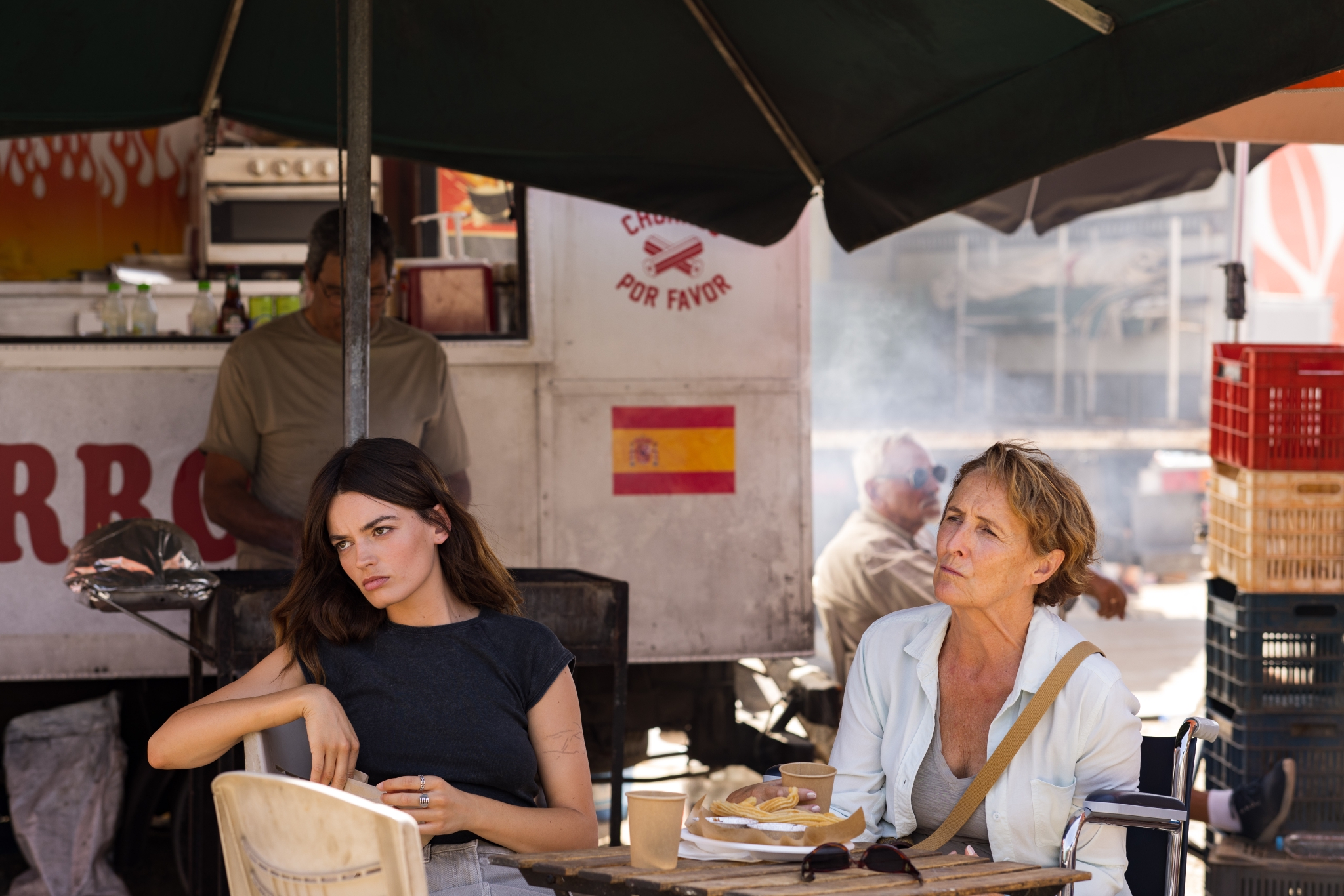
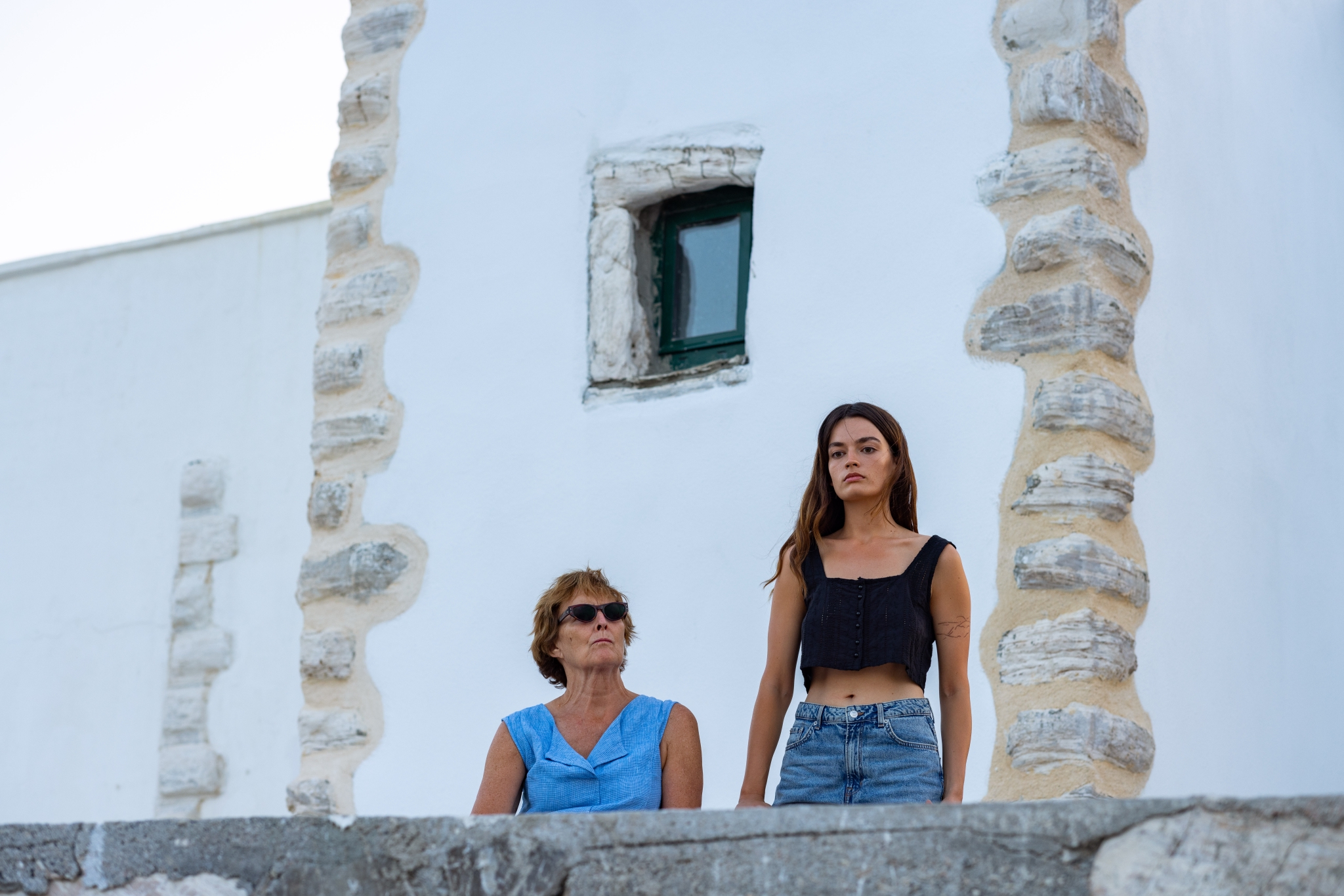
As Hot Milk—the anticipated adaptation of Deborah Levy’s novel—hits cinemas, Nadia Maria Oliva examines the thorny dynamics of the maternal-fillial trip on-screen.
It’s no accident that Rebecca Lenkiewicz’ newest film Hot Milk—an adaptation of Deborah Levy’s novel of the same name—begins with a quote by artist Louise Bourgeois: “I have been to Hell and back and let me tell you, it was wonderful.”
This thematic framing might gesture towards the vexing poles of suffering and beauty, or Bourgeois’ finding of joy after an arduous childhood. These are ideas that ripple through the French artist’s oeuvre, reaching an apex, I think, in her mesmeric sculptures of a spider, Maman [Mother] (1999). Bourgeois’ Maman holds an emotional charge—a bronze embodiment of the resourcefulness and quiet power of motherhood, her eight creeping limbs raising the sculpture to over 30 feet tall (for readers in London, the original Maman currently looms over Tate Modern’s Turbine Hall).
By turns protective and predatory, it’s when the arachnid’s maternal savvy tips into control and manipulation that Bourgeois, Levy’s and Lenkiewicz’ work most intersect.
In Hot Milk, we join Fia (Emma Mackey) and her mother Rose (Fiona Shaw) on a mother-daughter holiday; however, their purpose in coastal Spain extends beyond fun in the sun. Rose can’t—or won’t—walk, and they’ve paid €25K for experimental treatment to discover whether it’s the former or the latter. Fia’s life has long been preoccupied with caring for Rose, and she arrives in Almería hopeful that her mum will take to treatment. But Fiona Shaw’s Rose is cantankerous—stubborn at best, and willing to enact her suffocating influence on Fia at any given turn. What unfolds onscreen is Fia’s much-needed pressure valve release, her escape from the claustrophobia of this mother-daughter role reversal through a quickly escalating tryst with the enigmatic Ingrid (Vicky Krieps).

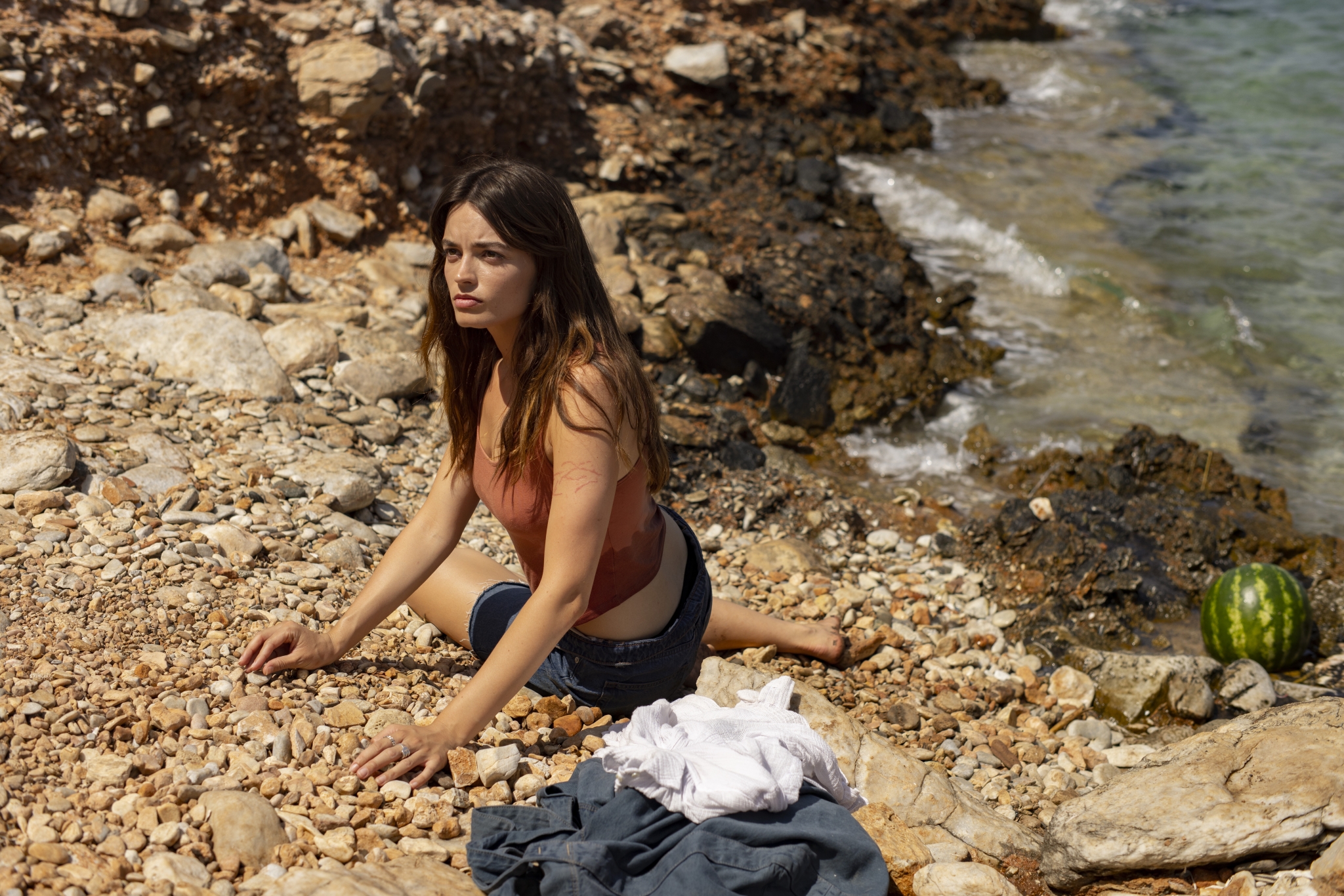
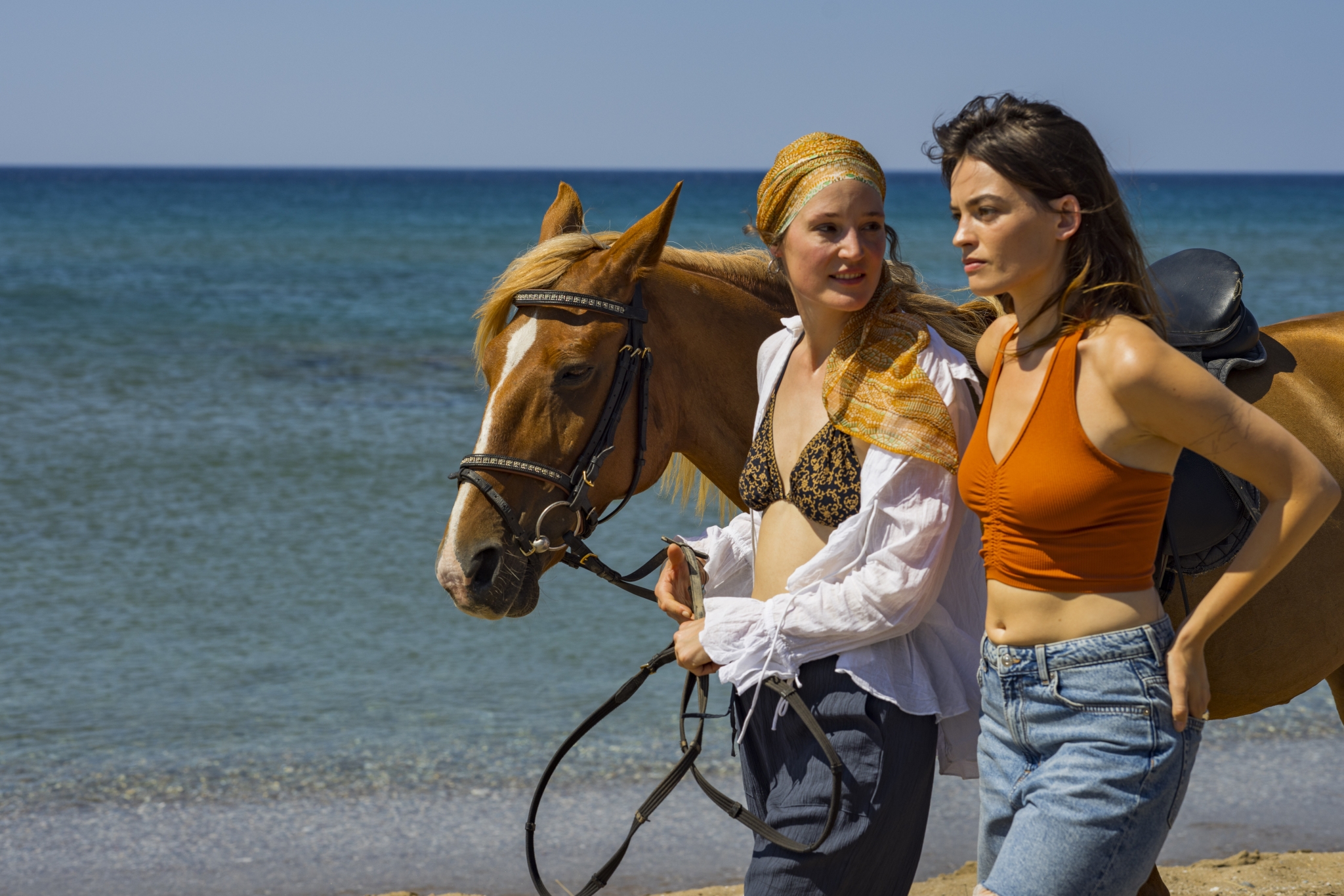
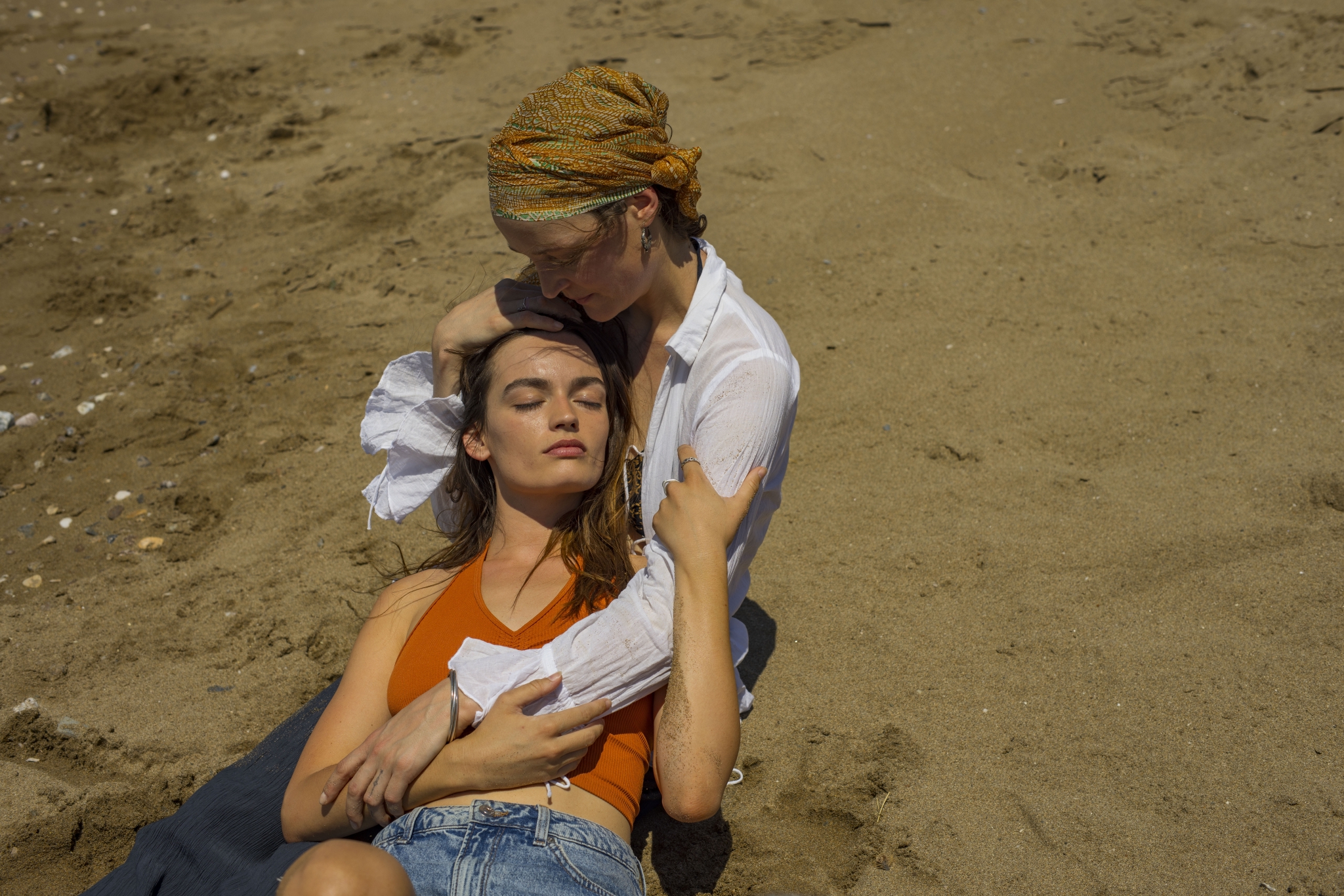
In name, Hot Milk evokes the nourishment of a mother’s milk which has been soured by the hot sun. There’s an unsavoury-ness to the phrase, an acknowledgement of the subtle unfolding of time that sets a young woman on a path apart from the crushing embrace of her mother—a duo nonetheless forever connected by the near-invisible strands of a spider’s web.
For anyone who’s ever found themselves on a holiday with their mother—as I myself happened to be as I wrote this piece it’s the ideal setting for vexing dynamics to bubble close to the surface. On holiday, we have the privilege of being thrust out of our usual routines and domestic structures, facing, instead, an abyss of idle time. Yet in some ways, holiday-making is home-making—an attempt to syncopate our daily rhythms and effectively recreate a home away from home (if only for a short period). That also means that the prisms through which these familial relationships typically work are warped just enough so as to unregulate everyone involved. And to be sure, everything is a little bit off in Almería—Rose complains that the water tastes different (even bottled water) and refuses to drink. There’s a neighbouring dog that barks incessantly, driving Rose and Fia to the brink on more than one occasion. The heat, too, is getting to them.
It’s a new environment Fia and Rose navigate together, one that readily demonstrates the mercurial nature of their mother-daughter bond. Fia calls her mum by her first name, while early on Rose corrects Fia that it was her house to mortgage for the treatment fee, not theirs. Fia is so understandably hopeful that Rose will walk again, Rose throws her a curveball saying she’ll instead amputate her legs. Despite the clear signs of codependency, the film is peppered with distancing effects that reveal this Spanish holiday to be an unlikely crucible for a daughter reconciling the puzzle of maternal love.
Hot Milk asks us to question a parent’s unchangeability—what it means to accept this, what it takes for a mother to truly claim ownership of her own suffering and ultimately, how a young person’s coming-of-age can warp under the weight of a parent’s unexamined past.
Nadia Maria Oliva
It’s not only mothers at play here, but what’s swirling around Hot Milk is also a latent exploration of sisterhood. Fia has a new half sister she’s yet to meet, Ingrid thinks she’s killed hers, and Rose’s ‘sister’ (as we believe through most of the film) died before she knew her. Sisterhood appears as a lateral move—a terrain where we see how the dynamics bottled by the mother-daughter relationship may actually play out. The revelation around Rose’s sister further confuses the mother, sister, daughter triad, leaving Rose being defined by a complex past she didn’t herself experience—matrilineal debt passed through the female line.
Fathers, on the other hand, linger on the periphery in Hot Milk, although arguably there are more films that center around the snags of father-daughter relationships in general. There’s even more of a shared cultural language to joke about it—comedian Ilana Glazer recently pointed out the sly catchiness of the phrase daddy issues compared to the restlessness/squirmishness of issues with your mother. Daddy issues are often represented in film as enigmatic, often characterised by an emotional chasm vis-a-vis the father’s absence. Issues with your mother? Well, it’s just messier.
Fia does visit her father, Christos, in Greece in a search for answers about Rose’s unspoken familial past. This visit makes Rose furious, the news of which causes her to smash a plate and stand up on her feet for the first time.
Christos is laid back in a way Rose can never be, easeful in sharp contrast to Rose’s enduring pain. He says of Rose that, “[she] feels pain acutely. She always has.” Is Christos speaking of Rose’s mental or physical pain here? What ails Rose remains unanswered, calling to mind the title of John Cassavetes’ A Woman Under the Influence—under the influence of what? Of whom?
Overexposed under the Spanish sun, Hot Milk asks us to question a parent’s unchangeability—what it means to accept this, what it takes for a mother to truly claim ownership of her own suffering and ultimately, how a young person’s coming-of-age can warp under the weight of a parent’s unexamined past.
Hot Milk will be released in the UK on 4 July.
To get in the mood for summer in the northern hemisphere, below are some films that, like Hot Milk, refract family histories through the disorienting prism of heat, or illness or idle time — those strange textures unique to family vacations, where emotional wounds are both exposed and ritualised.
Lucrecia Martel, La Ciénaga (2001)
A bourgeois Argentine family gathers at their crumbling summer estate during a sweltering holiday, where tensions simmer beneath the surface. Mothers are distant, children roam half-feral, and the domestic staff are quietly subjugated. The oppressive heat mirrors the emotional stagnation and class decay at play.
Olivier Assayas, Summer Hours (2008)
Three adult siblings reunite at their late mother’s idyllic country home in France, ostensibly for a summer break, but are soon forced to reckon with legacy, memory, and the dispersal of family possessions. Elegiac, restrained, and meditative in dealing with a family’s divergent values, in Summer Hours familial connection dissolves gently.
Deniz Gamze Ergüven, Mustang (2015)
In a conservative Turkish village, five orphaned sisters are confined to their home over the summer under increasing restrictions after a seemingly innocent beach outing. Sisterhood becomes a site of both intimacy and repression, with the sisters forming a private rebellion in the face of patriarchal control.
Maggie Gyllenhaal, The Lost Daughter (2021)
While vacationing alone on a Greek island, a middle-aged professor becomes entangled in the lives of a young mother and her daughter, triggering memories of her own complicated past as a mother. The film is psychologically tense and emotionally layered with holiday leisure becoming a mirror for maternal ambivalence and repressed guilt.
Céline Sciamma, Petite Maman (2021)
After the death of her grandmother, a young girl helps her parents clear out a rural house and meets a mysterious friend in the woods — who may be her mother as a child. Set during a few days of quiet time away, the tone is gentle, magical realist, and emotionally rich, the mother-daughter bond reimagined through time and play.





